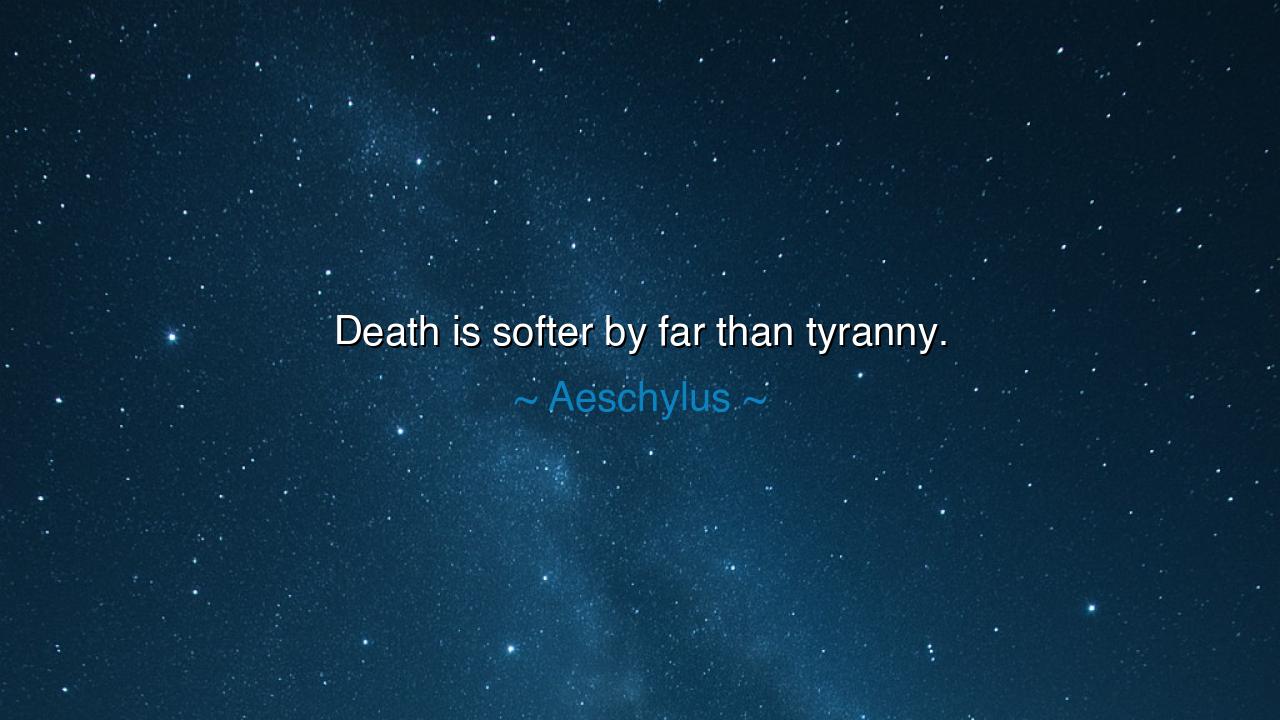
Death is softer by far than tyranny.






The words of Aeschylus — “Death is softer by far than tyranny.” — descend to us from the ancient world like thunder from a sacred mountain. They are not the idle musings of a poet, but the cry of a man who had seen the cost of oppression and the nobility of freedom. In these few words, Aeschylus, the father of Greek tragedy, speaks to the eternal struggle between the human spirit and the forces that would crush it. He reminds us that to live under tyranny is to die every day, while to die in defense of liberty is to live forever in the memory of the just. Death, which ends the suffering of the body, is a mercy compared to the slow and degrading death of the soul under the yoke of despotism.
To understand this quote, one must first know the man and the world from which it arose. Aeschylus was a soldier before he was a playwright — a warrior who fought at Marathon, defending Athens from the invading Persian Empire. He had seen firsthand the clash between freedom and tyranny, between a city that governed itself through reason and debate, and an empire ruled by the will of one man. His words, then, were born not in the luxury of reflection, but in the dust and blood of battle. For the Athenians of his time, tyranny was not an abstraction — it was a living terror that sought to erase their freedom, their voice, their very sense of self. Against such a force, Aeschylus declares that death is the gentler master.
In the tragedies of Aeschylus, tyranny is always portrayed as a sickness of the soul. It begins with arrogance — hubris — the belief that one man can stand above the law, above his fellow humans, above even the gods. But hubris brings ruin. For when power is concentrated in one hand, it corrupts not only the ruler but also the people, who learn to bow rather than to stand, to whisper rather than to speak, to survive rather than to live. The tyrant, Aeschylus warns, enslaves not only bodies but minds. Thus, the poet’s words become a timeless truth: that death, though final, preserves one’s dignity, while tyranny consumes it piece by piece until nothing remains.
History has proven the wisdom of this ancient voice. Consider the story of Socrates, who chose to drink the hemlock rather than submit to the unjust will of the state. He preferred death to the tyranny of silence, and in doing so, he preserved the freedom of the human spirit for all time. Or remember the Spartans at Thermopylae, who faced certain death rather than bend the knee to the Persian king. Their sacrifice became a beacon for generations, reminding mankind that freedom demands courage — and that sometimes the soft embrace of death is a lesser pain than the cruel suffocation of oppression.
Yet the truth of Aeschylus’s words is not only for warriors and kings, but for every human heart. For tyranny can take many forms. It may not always wear a crown or wield a sword; it can live in the small fears that keep us silent, in the injustices we accept rather than confront, in the chains we fashion for ourselves from comfort and cowardice. The poet calls us to remember that the human spirit was not made to serve, but to stand. To live truly is to live freely — and if we surrender that freedom, then even the longest life becomes a kind of living death.
There is also a spiritual dimension in these words, one that transcends politics. For tyranny is not only the rule of others, but the rule of fear within ourselves. Fear of truth, fear of loss, fear of change — these are the inner tyrants that rob the soul of its strength. To conquer them is to live in harmony with the divine order, just as Aeschylus’s heroes sought to align their will with justice and truth. Thus, when he declares that death is softer than tyranny, he is reminding us that integrity is worth more than survival, and that peace of soul is worth more than comfort of body.
The lesson, then, is eternal: choose freedom over fear, even when the price is great. Defend your conscience as fiercely as your life, for they are one and the same. Speak when silence is demanded of you, act when apathy tempts you, and remember that the true victory of a human being is not in power, but in the courage to remain just in an unjust world. Death may come for all, but tyranny is a choice — a surrender of the spirit that only the coward makes.
So let Aeschylus’s words be engraved upon your heart: “Death is softer by far than tyranny.” For freedom is the breath of the soul, and without it, even the living are among the dead. Stand, then, as the Athenians once stood — unbowed, unbroken, and unafraid — and know that a life lived in truth, though brief, is of greater worth than a thousand years lived in submission. For in the end, only the free truly live, and only the brave are truly free.






AAdministratorAdministrator
Welcome, honored guests. Please leave a comment, we will respond soon